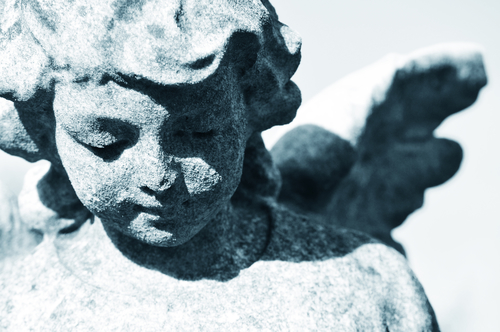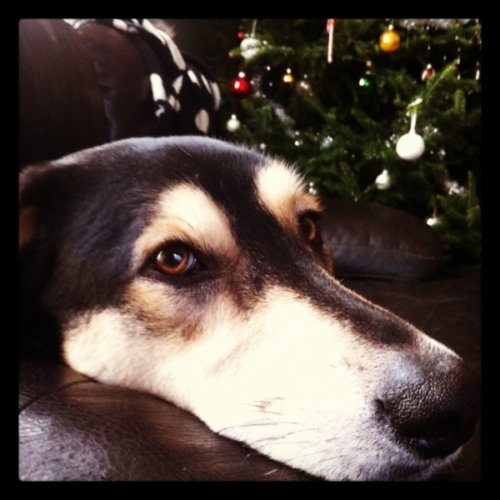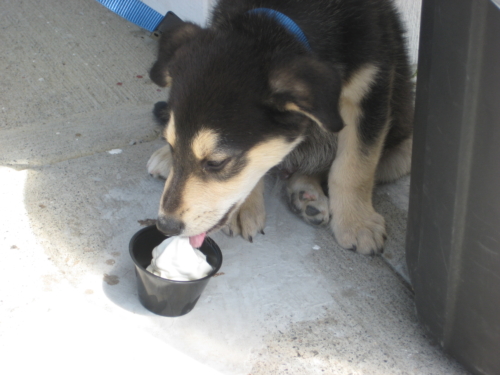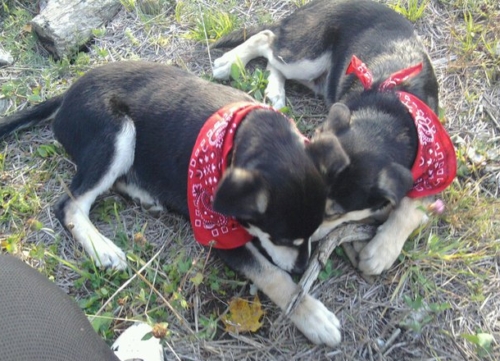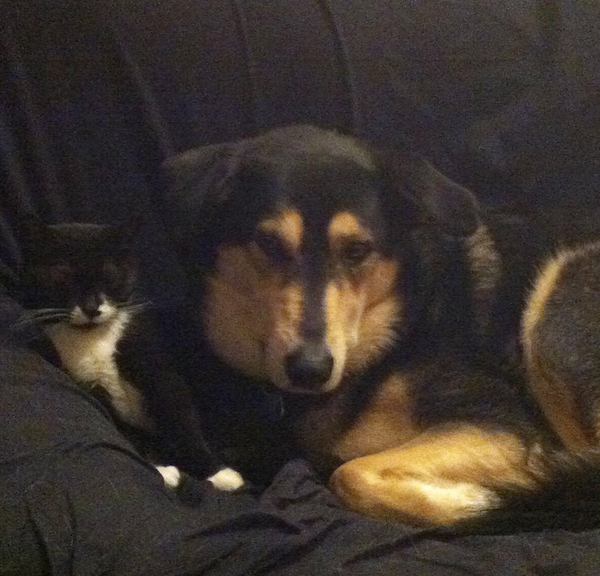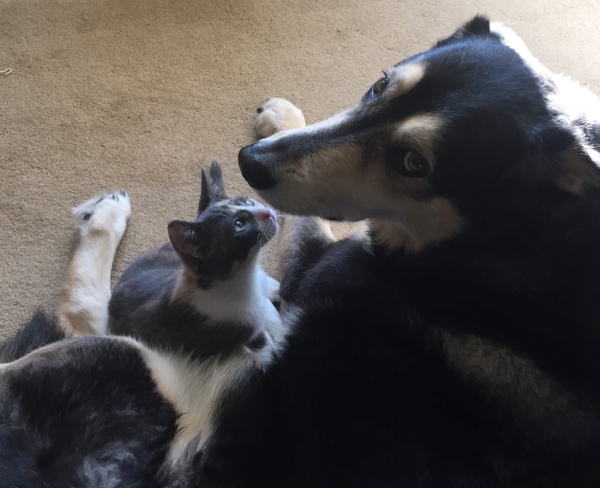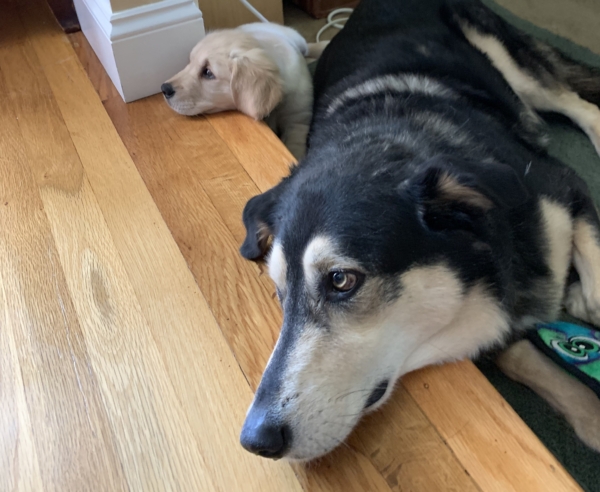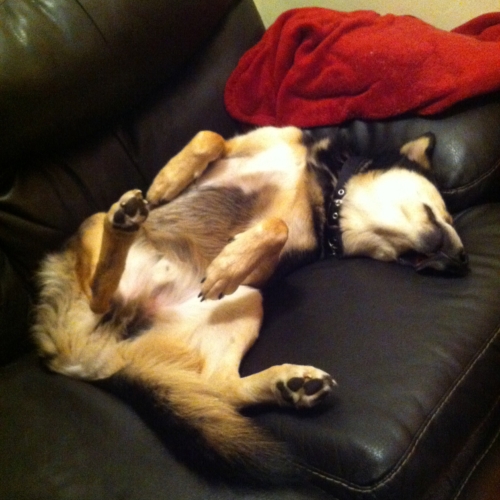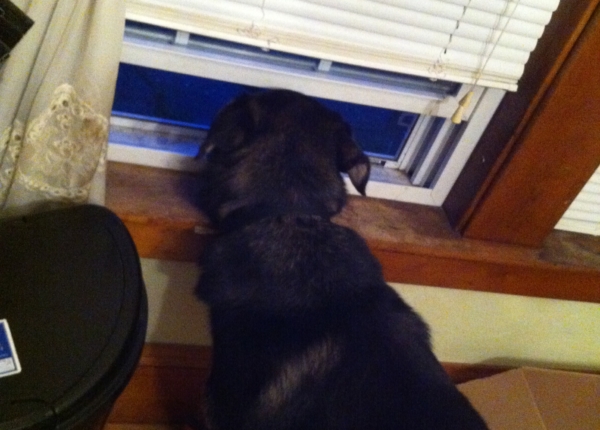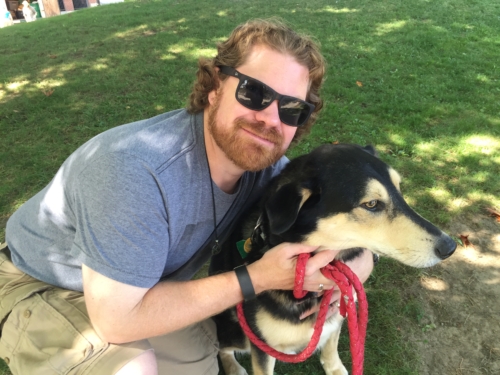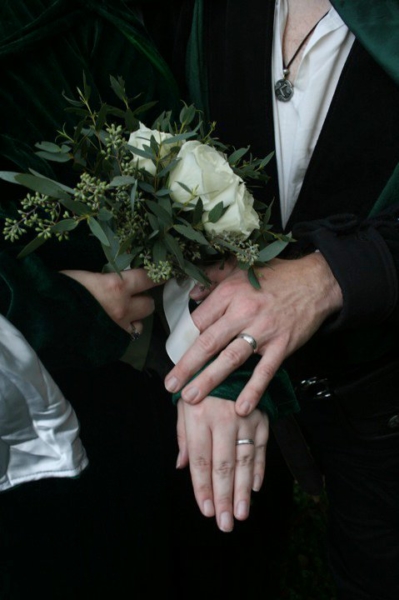“Ask yourselves as you go about your daily lives: How am I using my talents to help society? Because the most powerful lesson here is if more people lived their lives trying to be famous in death, the world would be a much better place.” —Lux Narayan
-
-
Farewell, sweet boy
Duncan Hines. Duncan Donuts. The Duncanator. Puppyface. He was a dog known by many names, but the one he officially received upon his appearance in our lives back in 2010 was Duncan Walker Weir.
He died last night at the age of 9 after suffering from a brain tumor.
Duncan was part of a litter of puppies born on a Vermont farm. As a birthday present to himself, Marcus adopted Duncan on the same day his friend Sherry adopted Duncan’s brother, Shakazulu. This meant the pups, who were nearly identical, would be able to spend their lives together.
If we went out of town, Duncan would stay at Shaka’s house and vice versa. It was during one of these visits that the brothers invented the game “Chase Me”:
After one such sleepover at our place, Sherry and Shaka got into their car to head home. Apparently Duncan didn’t want them to leave yet so he broke away from M’s grasp and chased after their car. Several drivers swerved to avoid him, but one vehicle struck Duncan and kept going, leaving his broken body on the side of the road. As neighbors sped after the hit-and-run driver, M raced to Duncan’s side.
Duncan survived the collision, thanks to the skills of emergency vets at the local animal hospital. He suffered multiple contusions and a broken hip that required both an operation and months of confinement. Eventually, Duncan did heal, but he never saw his brother again. Just before Duncan’s rehab was complete, another hit-and-run driver crashed into his brother. Sweet Shaka didn’t survive.
Once back on his feet, Duncan resumed his favorite activities: playing an abbreviated version of fetch (he refused to bring the ball back more than once or twice), rolling in the grass with his feet wildly dancing in the air, going on leashless hikes through the woods, running through fallen leaves, bathing in snow drifts and chewing on his toys.
The cats helped to raise Duncan so he never treated them like the enemy. Instead, he learned to purr as a sign of happiness (it sounded like a piggy grunt) and paid extra careful attention to his grooming habits. He befriended the neighbor’s outdoor tomcat, every squirrel who appeared in our yard and, unfortunately, a couple of less-than-thrilled skunks who he probably assumed were just smelly cats. After a litter of kittens arrived at our home last fall, Duncan immediately became their 90 lb. “big brother,” teaching them how to wrestle and beg for ham. And when our friends adopted a Golden Retriever puppy with special needs earlier this month, Duncan showed her the ropes.
Strangers who met Duncan would often ask about his ancestry. We tended to describe him as a “Heinz 57” dog (i.e., a mixture of several breeds, an all-around mutt). Over the years, M and I agreed that he appeared to be a unique combination of German Shepherd, some sort of retriever, a bit of husky and possibly a smidge of beagle.
Duncan generally preferred the company of women to men, though he made special allowances for the “pizza man.” This probably had more to do with the fact that we gave Duncan bits of our pizza crusts than an affinity for the fellow who delivered the pie. While kibble was his main source of sustenance and he was taught from an early age that it was impolite to beg, he still enjoyed the occasional piece of carrot, a hunk of cream cheese, a slice of salami and once, a stolen plate of pork chops.
Duncan kept me company while I worked through the night. Until illness affected his ability to climb stairs, he also rested near my bed while I slept during the day. He liked reclining on the loveseats and on the big dog pillows, but would forego these spots if the kitties were sleeping there first. The very best place to rest, however, was at our feet or by our side. He just loved being near “his people.”
In the few extended periods that we were separated from him, caregivers would remark on Duncan’s habit of waiting by the door or peering through the window, as if willing us to return.
Even if we just went out to eat for dinner or to a movie, we’d find him waiting at the garage door, his expression and demeanor making it clear that it felt like we had been gone forever. This was even more true for M, who was Duncan’s favorite. Anyone who spent time in our house saw that Duncan loved us both, yet he worshiped and adored M.
The two of them were boon companions. They swam together, did chores together, even went to work together. People on the hiking trails knew Duncan by sight, for he was friendly and well-behaved. M was simply known as “Duncan’s dad.” And when their stubborn personalities occasionally clashed, any disagreements were quickly forgiven.
Once we learned that Duncan had only a few months left to live, we vowed to make the most of that time. So we gave Duncan belly and chest rubs, balls and toys, rides and runs, so many treats and lots of love. When the cancer began to affect his sight, mobility and demeanor, we decided it was time to put him down.
Last night, after the vet gave Duncan the first shots — the ones that put him to sleep — he continued to look at us with his big, brown eyes. We pet his fur and told him how very much we loved him and it was clear he knew he would not die alone. Just before he received the fatal dose of medicine, Duncan gave M a few final licks and then he was gone.
-
Grief is the price we pay for love
I once lost a job because my grandmother was hospitalized with congestive heart failure. The doctors said she wouldn’t make it through the weekend and since I was within driving distance (about 250 miles away), I knew I had to make the trip.
When I told my boss I needed to take a few days off and why, he said: “Then don’t come back.” He wouldn’t let me use vacation days either because “such absences must be pre-approved.”
Needless to say, I quit the job, hopped in my car and drove to the hospital to be with her — a decision I’ve never regretted. However, the whole experience made me mindful of the fact that flexibility in the workplace is not guaranteed.
Lawmakers in New York are now considering a bill that would give every worker in the state three paid months of bereavement leave to mourn the death of a loved one. The bill is sponsored by Sen. Richard Funke of upstate Batavia, whose son died.
“I’ve experienced the pain of losing a child. The grief can be unpredictable and overwhelming,” Funke said in a statement. “No employee should have to fear losing their job in order to take the time they need to mourn.”
Some small business owners oppose the legislation, saying it would cause economic hardship and create staffing issues.
“Our business and any other small business it would be catastrophic. Twelve weeks paid leave. We need all the staff that we have,” Greg Greenwood, owner of Bleeker Street Pizza, said.
If the bill passes and the governor signs it into law, New York would become the third state -– after Oregon and Illinois -– to offer a bereavement benefit and the second to provide paid leave. What do you think?
[socialpoll id=”2516261″]
–Quote is from Queen Elizabeth II
-
The empty space left by death
In her essay, “You May Want to Marry My Husband,” the late author and filmmaker Amy Krouse Rosenthal gave her husband Jason permission to move on and find happiness. A year after her death, he shared these insights on experiencing grief and starting over:
-
A marriage, even in grief
…To have and to hold from this day forward, for better or for worse, for richer or for poorer, in sickness and in health, to love and to cherish, for as long as you both shall live?
One of the best parts of marriage is that a shared history gives you an understanding of how your spouse will react in certain situations. Over time, you will experience highs and lows, triumphs and tragedies, and all of the middling life stuff that occurs in between.
This weekend, M and I sat on the floor of our library and watched our eldest cat take her final breaths. When the light left her eyes, we pet her soft fur for the last time and weeped.
Once the tears finally abated, the mourning process began. This is something that we experience very differently. Sharing stories about the deceased helps him, as does actively seeking distraction. For me, I need to efficiently deal with the cleanup of Death’s visit and then I prefer to grieve alone, in silence.
These two styles don’t always mesh, and yet because we’ve been together so long, we’ve managed to figure out a way to face such difficulties together. Generally this involves doing what one person wants, followed by the other, trading coping mechanisms until the sadness stops overwhelming all else.
Loss is agonizing, even when expected. But sharing it with someone you love — someone who truly understands your nature — does make it a little more manageable. I am grateful for him, and for us.
